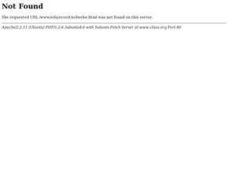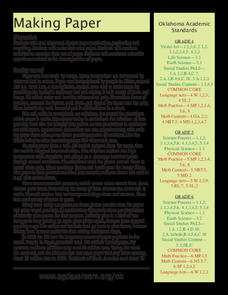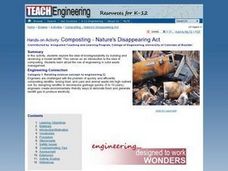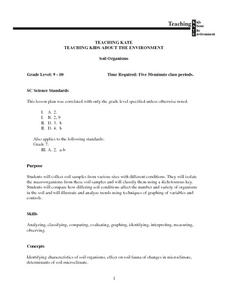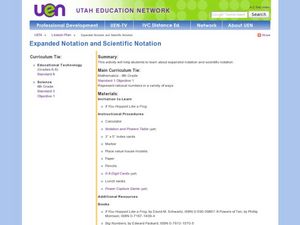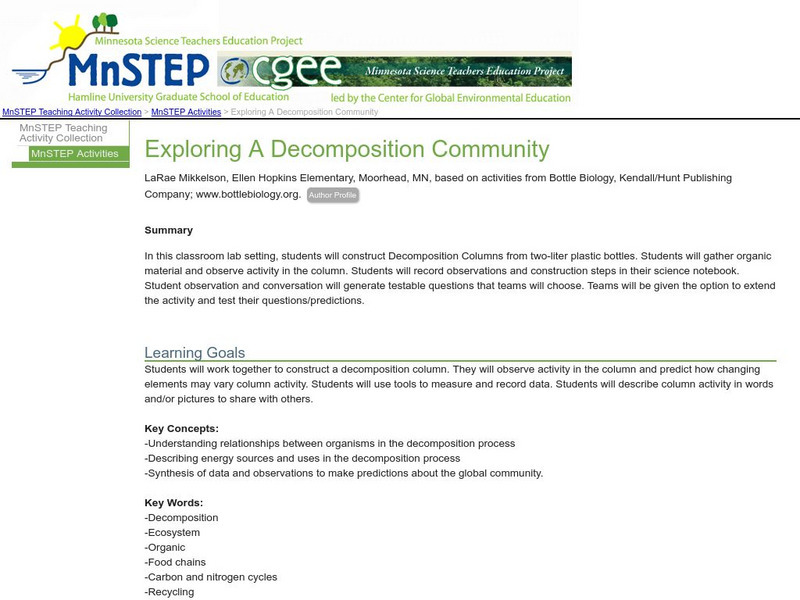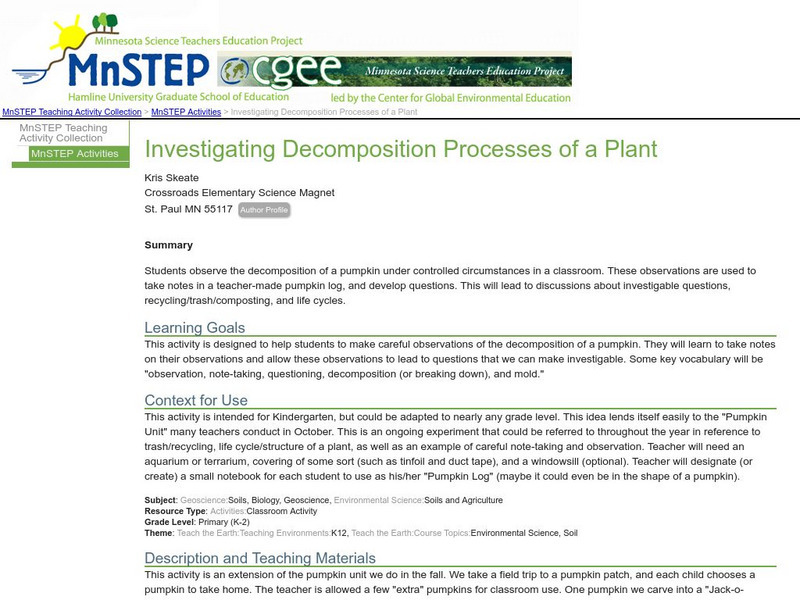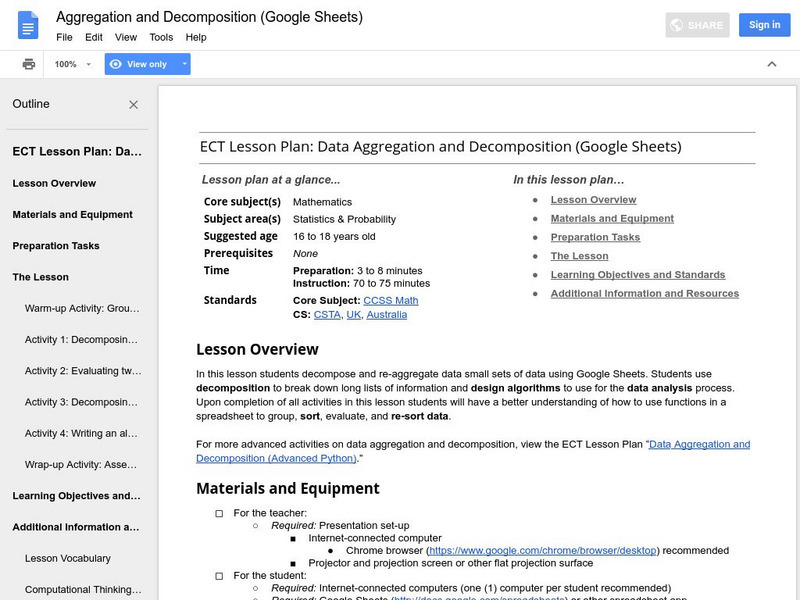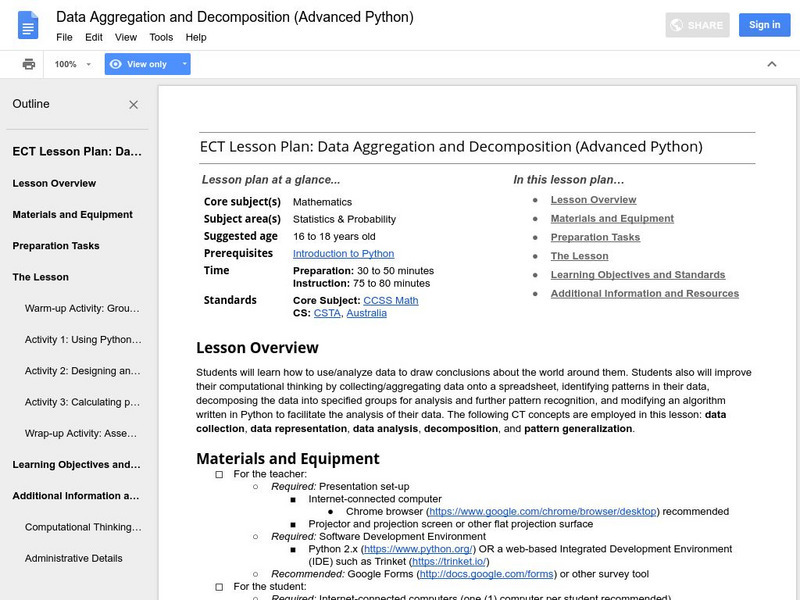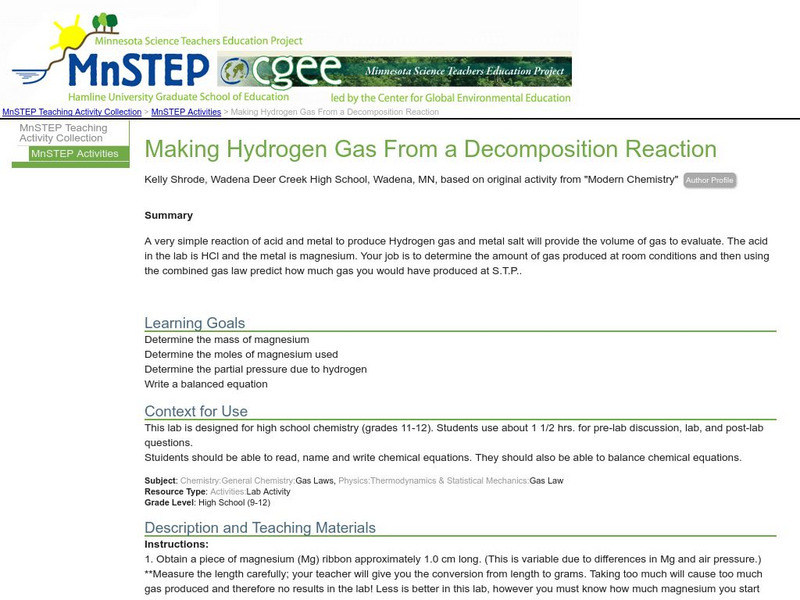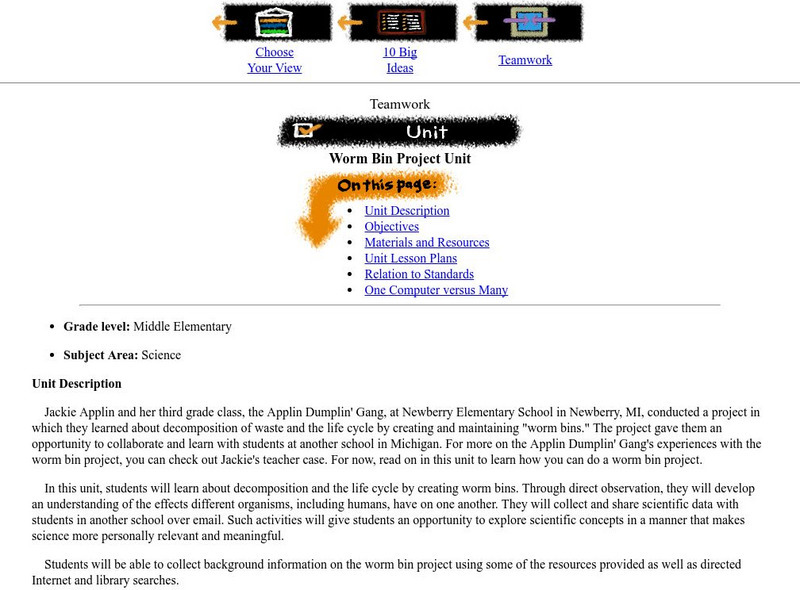Curated OER
Household Pests
Sixth graders discover the various habitat requirements for assorted household pests from ants to wasps. They conduct various activities including researching the life cycles moths, cockroaches, and mosquitoes
Curated OER
Compost Columns
In this unit of lessons, students examine the role of compost columns and recycling. They create a KWL chart about garbage in Chicago. They also examine life cycles and packaging of everyday products.
Curated OER
Water Quality
Students examine pieces of expository writing. They identify key words and vocabulary. In other activities, they read about water quality to practice reading for comprehension.
Curated OER
Making Paper
Fourth graders investigate the paper usage in their classroom and in other countries by using estimation, counting, and measurement skills. They make paper from recycled paper.
Curated OER
Composting -- Nature's Disappearing Act
Studenst work together to discover the concept of biodegradability. They build a model of a landfill and how different items decompose. They examine how engineers use this information for better waste management.
Curated OER
Can Fun Gus Help Plants/Trees Grow?
Students participate in an experiment in which they test the growth of different types of plants. They discover how growth rates vary using inoculum. They draw pictures and are read books about plants to end the lesson.
Curated OER
Our Landfill Future
Students use the internet to research articles on garbage, landfills and the environment. In groups, they identify ways to conserve or recycle materials found in landfills and determine the future of a local landfill. They share their...
Curated OER
Soil Organisms
Pupils work together to collect soil samples from different locations. In the samples, they identify the macroorganisms and classify them. They identify the conditions that affect how macroorganisms grow. They also analyze and identify...
Curated OER
Origin of Coal
Students explore how coal is formed. They then discuss the information and answer any questions that they may have on the formation of coal. Students then answer questions in reference to the coal discussion and reading.
Curated OER
Demonstrate Your Chemistry
Learners research and evaluate chemical reaction demonstrations that are found on the web. they work in small groups to choose a demonstration that fits a particular category of reaction and then perform the demonstration for the class.
Curated OER
Chemical Changes
Students explore chemical changes. in this instructional activity about the properties of chemical changes, students do experiments, observe, and record results. Students complete four experiments in order to observe chemical changes. In...
Curated OER
Represent Rational Numbers
Students identify expanded notation and scientific notation. In this rational numbers lesson plan, students use a calculator to discover the powers of 10. Students practice writing numbers in expanded notation using powers of 10....
Curated OER
Code Makers - Electron Configuration, Aufbau Principle
Learners write the electron configuration of elements using the Aufbau principle. In this chemistry lesson, students build their own key that demonstrates the principle.
Science Education Resource Center at Carleton College
Serc: Exploring a Decomposition Community
A lab where students construct Decomposition Columns from two-liter plastic bottles, and then observe them over a period of time.
Science Education Resource Center at Carleton College
Serc: Investigating Decomposition Processes of a Plant
Students observe the decomposition of a pumpkin under controlled circumstances in a classroom. This can be used to lead discussions on recycling, trash, composting, or life cycles.
Google
Google for Education: Data Aggregation and Decomposition (Excel)
By using Microsoft Excel, students collect, decompose, and re-aggregate class data. Students use computational thinking skills by decomposing long lists of information and writing basic algorithms to help analyze data.
Google
Google for Education: Data Aggregation and Decomposition (Python)
Students learn how to use and analyze data to draw conclusions about information collected from classmates. Then they use computational thinking by collecting and aggregating data onto a spreadsheet, identifying patterns in their data,...
Science Education Resource Center at Carleton College
Serc: Making Hydrogen Gas From a Decomposition Reaction
A very simple reaction of acid (HCl) and metal (magnesium) to produce Hydrogen gas and metal salt will provide the volume of gas to evaluate. Learners will determine the amount of gas produced at room conditions and then using the...
TeachEngineering
Teach Engineering: Dirty Decomposers
Young scholars design and conduct experiments to determine what environmental factors favor decomposition by soil microbes. They use chunks of carrots for the materials to be decomposed, and their experiments are carried out in plastic...
Michigan State University
Michigan State University: Lets Net: Worm Bin Project Unit
Students learn about the worm life cycle and decomposition of life by creating small-scale worm ecosystems. Research groups share scientific data with groups at other schools using web-based communication tools.
Science Education Resource Center at Carleton College
Serc: Bottle Biology
This activity book explores science and the environment through soda bottles and other recyclable materials. Sections include bottle basics, decomposition column, kimchee (fermentation), soil meditations, predator-prey column, TerrAqua...
American Chemical Society
Middle School Chemistry: Lesson Plans: A Catalyst and the Rate of Reaction
Students observe and investigate how a catalyst increases the rate of a chemical reaction while not becoming part of the products of the reaction.
Alabama Learning Exchange
Alex: Types of Chemical Reactions and Predicting Products
The guided inquiry activity enables learners to identify the five basic types of reactions - synthesis or composition, decomposition, combustion, single replacement and double replacement. Students will also begin to predict the products...
Student Achievement Partners
Illustrative Mathematics: Addition and Subtraction Fluency Set of Tasks [Pdf]
Students explore the relationship between addition and subtraction and develop an understanding of decomposing numbers in different ways in this first-grade lesson plan.
Other popular searches
- Body Decomposition
- Decomposition Reactions
- Synthesis and Decomposition
- Decomposition Grade 3
- Subtraction Decomposition
- Human Decomposition
- Decomposition or Synthesis
- Decomposition of Plastic
- Decomposition of Organics
- Decomposition Grades K 3
- Fraction Decomposition
- Acid Decomposition

